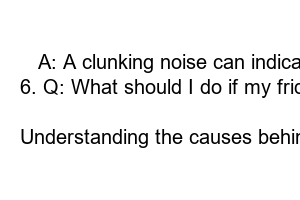냉장고 소음 원인
Title: Causes of Refrigerator Noise: Unveiling the Culprits Behind that Unsettling Buzz
Introduction:
We’ve all experienced it at some point – that mysterious noise emanating from our refrigerator, interrupting the calmness of our homes. But fear not! In this blog post, we will explore the common causes behind these refrigerator noises and offer some insights on how to address them.
1. Vibrating Compressor:
When your fridge starts vibrating with an intensity that rivals a dance floor, it’s likely due to a malfunctioning compressor. This vital component’s job is to circulate refrigerant, and when it becomes worn out or clogged, the resulting vibration can rattle your fridge. Regular maintenance and cleaning can help prevent this issue.
2. Faulty Evaporator Fan Motor:
A faulty evaporator fan motor can cause a loud, continuous humming noise. This motor aids in the circulation of cool air throughout the refrigerator. If it becomes damaged or wears out, it may need to be replaced. Regularly cleaning the fan blades can help prevent unnecessary strain on the motor.
3. Damaged Condenser Fan Motor:
If you notice a high-pitched noise coming from the rear of your fridge, it could be a damaged condenser fan motor. This motor is responsible for cooling the compressor, and a malfunction can disrupt the cooling process. Cleaning the fan blades and ensuring proper ventilation can help prevent this issue.
4. Ice Buildup in the Freezer:
Ice buildup in the freezer can cause unusual noises such as cracking, popping, or hissing sounds. This typically occurs when warm air enters the freezer and meets the cold surfaces, resulting in frost accumulation. Regularly defrosting the freezer and checking the door seals can prevent this problem.
5. Blocked or Faulty Water Inlet Valve:
A blocked or faulty water inlet valve can lead to a humming or buzzing noise emanating from the fridge. This valve controls the flow of water into the ice maker or water dispenser. Cleaning or replacing the valve can resolve the issue.
6. Misaligned Water Line:
If your refrigerator has a water dispenser, a misaligned water line can lead to annoying rattling or water hammer noises. Readjusting the water line or ensuring it is properly connected can eliminate these noises.
Frequently Asked Questions (FAQs):
1. Q: Why does my refrigerator make a clicking sound?
A: A clicking noise is often an indication of a faulty start relay or compressor issue.
2. Q: How can I reduce refrigerator noise?
A: Regular cleaning, maintenance, and proper ventilation can help reduce refrigerator noise.
3. Q: Should I be worried if my refrigerator makes a gurgling sound?
A: Gurgling sounds are typically normal and occur due to refrigerant flowing through the system.
4. Q: What does it mean if my fridge suddenly starts making loud squealing noises?
A: Loud squealing noises can signify a worn-out evaporator fan motor or damaged fan blades.
5. Q: Why is my refrigerator making a clunking noise?
A: A clunking noise can indicate a loose or damaged motor or compressor component.
6. Q: What should I do if my fridge is still making noise after addressing the common causes?
A: If the noise persists, it’s best to contact a professional technician to diagnose and resolve the issue effectively.
Summary:
Understanding the causes behind refrigerator noises is crucial in maintaining a peaceful household. From malfunctioning compressors to misaligned water lines, taking appropriate measures such as regular cleaning, maintenance, and timely repairs can significantly minimize the unwanted noises. Remember, a well-functioning fridge not only keeps your food fresh but also helps create a serene environment in your home.

